Related Research Articles
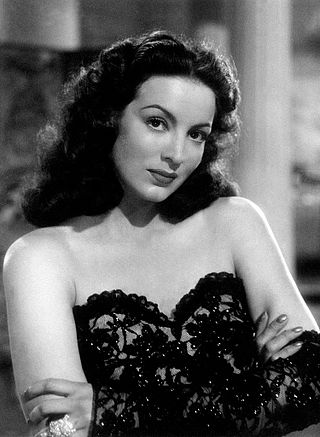
María de los Ángeles Félix Güereña was a Mexican actress and singer. Along with Pedro Armendáriz and Dolores del Río, she was one of the most successful figures of Latin American cinema in the 1940s and 1950s. Considered one of the most beautiful actresses of the Golden Age of Mexican cinema, her strong personality and taste for finesse garnered her the title of diva early in her career. She was known as La Doña, a name derived from her character in Doña Bárbara (1943), and María Bonita, thanks to the anthem composed exclusively for her as a wedding gift by Félix's second husband, Agustín Lara. Her acting career consists of 47 films made in Mexico, Spain, France, Italy and Argentina.

María de los Dolores Asúnsolo y López Negrete, known professionally as Dolores del Río, was a Mexican actress. With a career spanning more than 50 years, she is regarded as the first major female Latin American crossover star in Hollywood. Along with a notable career in American cinema during the 1920s and 1930s, she was also considered one of the most important female figures in the Golden Age of Mexican cinema, and one of the most beautiful actresses of her era.

Pedro Gregorio Armendáriz Hastings was a Mexican-American film actor who made films in both Mexico and the United States. With Dolores del Río and María Félix, he was one of the best-known Latin American movie stars of the 1940s and 1950s.
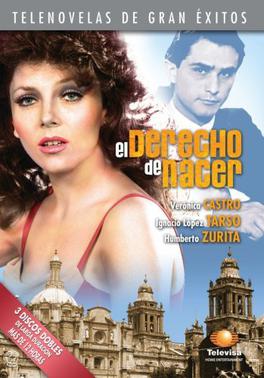
El derecho de nacer is a Mexican telenovela produced by Ernesto Alonso for Televisa in 1981. Based on the Cuban radionovela of the same name written by Félix B. Caignet adapted for TV by Fernanda Villeli and directed by Raúl Araiza.

Emilio "El Indio" Fernández Romo was a Mexican film director, actor and screenwriter. He was one of the most prolific film directors of the Golden Age of Mexican cinema in the 1940s and 1950s. He is best known for his work as director of the film María Candelaria (1944), which won the Palme d'Or award at the 1946 Cannes Film Festival. As an actor, he worked in numerous film productions in Mexico and in Hollywood. He was the father of the Mexican actor Jaime Fernández.

Miroslava Šternová, known professionally as Miroslava Stern, was a Czechoslovak-Mexican actress.

María Cecilia Suárez de Garay is a Mexican actress and activist working with the United Nations and European Union campaigning against femicide and violence against women. She has starred in film, television, and theater across the United States, Mexico, and Spain.

María Candelaria is a 1943 Mexican romantic film written and directed by Emilio Fernández and starring Dolores del Río and Pedro Armendáriz. It was the first Mexican film to be screened at the Cannes International Film Festival where it won the Grand Prix becoming the first Latin American film to do so. María Candelaria would later win a Silver Ariel award for Best Cinematography.
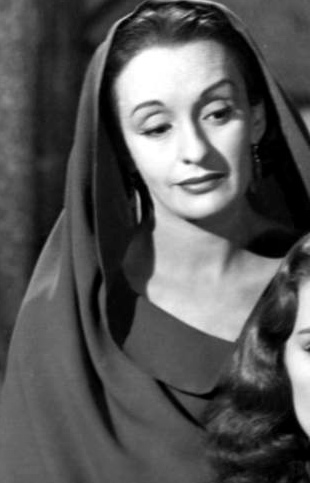
Guadalupe Bracho Pérez-Gavilán, known professionally as Andrea Palma, was a Mexican actress. She was considered the first major female star of the Mexican cinema after her role in the Mexican film La Mujer del Puerto (1934).

Emelia Pérez Castellanos, known professionally as Ninón Sevilla, was a Cuban-Mexican actress and dancer.
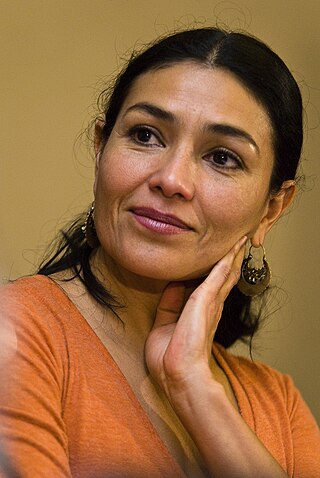
Dolores Heredia Lerma is a Mexican actress.
StellaInda was a Mexican film actress. She was the star of notable Mexican films, including Los olvidados by Luis Buñuel in 1949.

Tina Romero is a U.S-Mexican actress. A native of New York City, Romero moved to Mexico in her youth, and later established a career there as an actress. Her early film roles included The Divine Caste (1973) and the title character in the horror film Alucarda (1977). She has also appeared in U.S. films, including Missing (1982), opposite Sissy Spacek and Jack Lemmon.

Elsa Cárdenas Rentería is a Mexican actress. Since 1954 she has appeared in more than 100 films and television shows. She starred in the film Happiness, which was entered into the 7th Berlin International Film Festival. She acted alongside many stars, including James Dean in Giant and Elvis Presley in Fun in Acapulco. She was formerly married to Houston independent oil operator Guy Patton.

Susana Guenola Zubiri, better known as Susana Freyre, is an Argentine actress. She appeared in 30 films and television shows between 1945 and 1984. She starred in the film Three Loves in Rio, which was entered into the 9th Berlin International Film Festival.
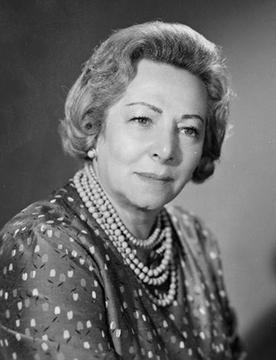
Fanny Schiller Hernández was a Mexican award-winning character actress and television star, who also acted in operettas and musicals, during the Golden Age of Mexican cinema. She won two Ariel Awards for best supporting actress, and was nominated for two additional films. She was a social activist, creating the Actor's Union and inspiring the creation of “Rosa Mexicano”. She was accomplished at dubbing and was the voice of many animated characters as well as the official voice of several other notable Mexican actresses.

Anita Blanch was a Spanish-born, Mexican actress, who worked in the Golden Age of Mexican cinema. She was nominated for an Ariel Award from the Mexican Academy of Film three times and won the Best Supporting Actress Award from Diosa de Plata in 1963.

Anabel Gutiérrez Aicua was a Mexican actress and comedian. Her most memorable works included her participation in the film School for Tramps (1955), as well as her appearances on the program Chespirito (1970), playing the character of Doña Espotaverderona in some sketches.
The Thief is a 1947 Mexican comedy film directed by Julio Bracho and starring Luis Sandrini, Domingo Soler and Elsa Aguirre.
La casa chica is a 1950 Mexican drama film directed by Roberto Gavaldón and starring Dolores del Río.
References
- ↑ Casa De Mujeres. "VHS Release Date: March 25, 1992."
- ↑ Ramón (1997), vol. 3, p. 24-25 Dolores del Río
- ↑ Casa de mujeres: Cast